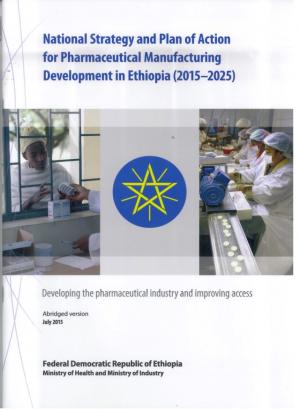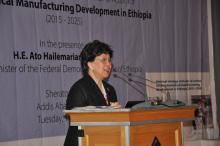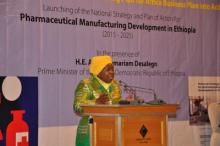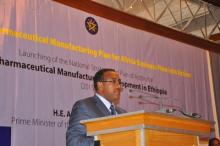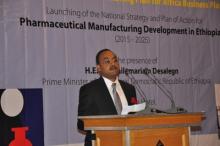Landmark Launching of a 10-Year Strategy and Plan of Action to Transform Local Pharmaceutical Industry
Implementation will Improve Access to Medicines
The week of the third International Conference on Financing for Development (FfD) was an opportune time to launch the ambitious 10-year National Strategy and Plan of Action to Develop Local Pharmaceutical Manufacturing Capacity in order to increase access to locally manufactured, quality-assured, medicines. The FfD brought together high level persona from key health and development partners, most of whom attended and spoke at the launching event.
The Strategy and Plan of Action, which wasendorsed earlier in the month of June 2015, was launched by His Excellency, Mr Demeke Mekonnen, Deputy Prime Minister of Ethiopia on 14 July 2015 in the presence of regional and global partners.
The World Health Organization (WHO), in collaboration with the European Union Commission and the Bill and Melinda Gates Foundation, provided technical assistance to the Government of Ethiopia in the development of this strategy, the first of its kind in the country. The launch took place at a high-level event organized in Addis Ababa, during the third Financing for Development Conference.
As he welcomed participants to the Launch event, Dr Kesetebirhan Admasu, Ethiopia Minister of Health, highlighted that the new strategic plan will not only improve access to essential medicine, but will also contribute to building a knowledge economy, harnessing research and development, "Exerting a positive pressure on the country’s educational system.”
WHO Director-General, Dr Margaret Chan invited all development partners to join WHO in supporting the implementation of this strategic action plan over the next 10 years, underscoring that “Access to medicines is an integral component of universal health coverage,”
African Union Chairperson, Dr Nkosazana Dlamini-Zuma, commended the Ethiopian government for launching this strategy, which is a translation of the African Union Pharmaceutical Manufacturing Plan for Africa (PMP) at country level. Dr Mustapha Kaloko, African Union Commissioner for Social Affairs, presented the PMP, which envisions an “African people with access to essential, quality, safe and effective medical products and technologies.”
Prof Tsige Gebremariam of Addis Ababa University School of Pharmacy, while presenting an overview of the National Strategy and Plan of Action for Pharmaceutical Manufacturing Development in Ethiopia (2015-2025) pointed out the seven key objectives of this ambitious plan:
The Deputy Prime Minister of Ethiopia, at the launch of the national strategy, announced that this plan will be a flagship program of the Ethiopian Growth and Transformation Plan (GTP II), emphasing that “[It] will contribute significantly to the country’s economic growth and social development.”
Ethiopia’s increased investment in the health sector in recent years has resulted in an impressive 95% potential health coverage. The health indicators have remarkably improved towards achieving the health-related MDGs.
WHO Director General Dr Margaret Chan, UNOPS Executive Director Ms. Grete Faremo, GAVI CEO Dr Seth Berkley, World Bank Senior Director of Health, Nutrition and Population Dr Timorthy Grant Evans, Global Fund Against AIDS, TB and Malaria Executive Director Mr Mark Dybul, African Development Bank Vice President Mr Steve Kayizi Mugerwa, UNIDO Director General Mr LI Yong, UNDP Administrator Mrs Helen Clark, UNFPA Executive Director Dr Babatunde Osotimehin, UNAIDS Deputy Executive Director Luiz Loures, UNICEF Deputy Executive Director Ms Yoka Brandt, US Ambassador Ms Patricia M Haslach, India Ambassador Mr Sanjay Verma, Brazil Ambassador Mrs Isabel Cristina de Azevedo Heyvaert, and Cuba Ambassador Mr Pedro Luis Pedroso Cuesta commended the Government of Ethiopia for developing such a comprehensive national strategy and plan of action, which is indeed a visionary programme of action. If implemented from a value chain perspective, and with commitment to ensure sustainability – by making the required investments and forging strategic partnerships – it could transform the pharmaceutical sector in the country over the next 10 years, and inspire change in Africa.
For more information, please contact:
Abraham Gebregiorgis
email: gebregiorgisa [at] who.int (gebregiorgisa[at]who[dot]int)
Photos: WHO Ethiopia/ Biniyam Fisseha and Loza Mesfin



